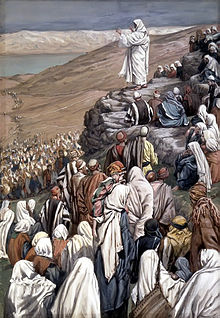
Back تطويبات Arabic تطويبات ARZ Евангелски блаженства Bulgarian Benaurances Catalan Mga Kabulahanan CEB Blahoslavenství Czech Òsmë błogòsławiéństwów CSB Saligprisningerne Danish Seligpreisung German Μακαρισμοί Greek

The Beatitudes (/biˈætɪtjudz/) are blessings recounted by Jesus in Matthew 5:3-10 within the Sermon on the Mount in the Gospel of Matthew, and four in the Sermon on the Plain in the Gospel of Luke, followed by four woes which mirror the blessings.[1][2]
In the Latin Vulgate, each of these blessings begins with the word beātī, which translates to 'blessed' (plural adjective). The corresponding word in the original Greek is μακάριοι (makarioi), with the same meaning.[a][4] Thus "Blessed are the poor in spirit" appears in Latin as beātī pauperēs spīritū.[5] The Latin noun beātitūdō was coined by Cicero to describe a state of blessedness and was later incorporated within the chapter headings written for Matthew 5 in various printed versions of the Vulgate.[6] Subsequently, the word was anglicized to beatytudes in the Great Bible of 1540,[7] and has, over time, taken on a preferred spelling of beatitudes.
While some opinions can differ as to exactly how many distinct statements into which the Beatitudes should be divided (ranging from eight to ten), most scholars consider them to be only eight.[8][9] These eight of Matthew follow a simple pattern: Jesus names a group of people normally thought to be unfortunate and pronounces them blessed.[1]
- ^ a b Majerník, Ján; Ponessa, Joseph; Manhardt, Laurie Watson (2005). The Synoptics: Matthew, Mark, Luke. Steubenville, OH: Emmaus Road. pp. 63–68. ISBN 1-931018-31-6.
- ^ "Matthew 5:3-10 - NIV - "Blessed ar..." www.christianity.com. Retrieved 2024-09-07.
- ^ Roselli, David Kawalko (April 2007), "Gender, Class and Ideology: The Social Function of Virgin Sacrifice in Euripides' Children of Herakles", Classical Antiquity, 26 (1), University of California Press: 81–169, doi:10.1525/ca.2007.26.1.81.
- ^ Liddell; Scott, Lexicon,
Blessed, happy, fortunate; in Attic, one of the upper classes.
- ^ The Vulgate New Testament with the Douay Version of 1582 in Parallel Columns. Samuel Bagster and Sons. 1872. p. 5.
- ^ Savage, Henry Edwin (1910). The Gospel of the Kingdom. p. 69.
- ^ Great Bible. 1540. p. 431.
- ^ Aune, David Edward (2003). The Westminster Dictionary of New Testament and early Christian literature. Westminster John Knox Press. pp. 75–78. ISBN 978-0-664-21917-8.
- ^ Beatitudes. Retrieved September 5, 2013.
{{cite book}}:|work=ignored (help)
Cite error: There are <ref group=lower-alpha> tags or {{efn}} templates on this page, but the references will not show without a {{reflist|group=lower-alpha}} template or {{notelist}} template (see the help page).